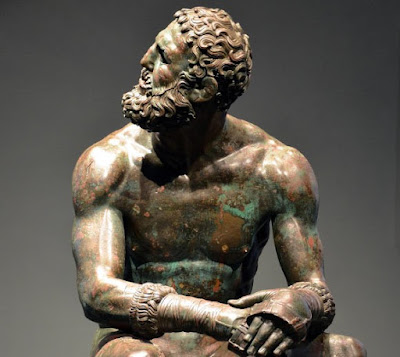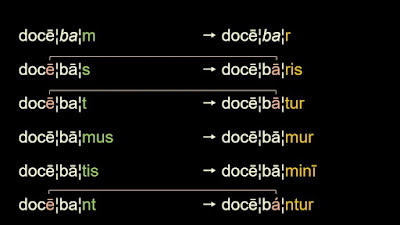Ad Iūliae casam _______ venit.
Rubra est pīrātae tunica, splendidae sunt ______ et hasta.
Iūlia prope ______ portam stat et _________ spectat;
_________ hastam et _______ et tunicam rubram amat et laudat.
Pīrāta quoque Iūliam et ______ et ______ laudat.
"Ō Iūlia," inquit, "pulchra es puella et
pulchrae sunt ______ tuae.
__________ mea pulchra est. Alta est ______ ___________
meae.
In extrēmā nāviculā ___ et nāviculam _________.
Alba est nāvicula mea; nunc prope ōram maritimam
______"
Tum Iūlia cum _______ ad ōram maritimam ambulat et
___________ albam _________.
Iūlia et pīrāta _______ nāviculae multīs ______ _______.
Subitō pīrāta puellam in ___________ _______.
Multae sunt lacrimae puellae, sed frūstrā – pīrāta in
extrēmā __________ stat et nāviculam __________.
casae; casam; galea; galeam; gubernat; gubernō; iactat; nāvicula;
nāviculā; nāviculae; nāviculam; nāviculam; ōrnant; pīrāta; pīrātā; pīrātae; pīrātam;
prōra; prōram; rosae; rosās; rosīs; spectat; stat; stō
A pirate comes
to Julia's cottage. The pirate's coat is red, the helmet and spear are
bright. Julia stands near the door of the cottage and looks at the
pirate; she loves and praises the pirate's spear and helmet
and red coat. The pirate also praises Julia and the cottage and the
roses. "Oh Julia," he says, "you are a beautiful girl and
your roses are beautiful. My boat is beautiful. The prow of
my boat is high. I stand at the edge of the boat and steer the
boat. My boat is white; now it stands near the seashore."
Then Julia walks with the pirate to the seashore and looks at the white boat. Julia and the pirate decorate the prow of the boat with many roses. Suddenly the pirate throws the girl into the boat. The girl’s tears are many [= girl is very tearful], but in vain – the pirate stands at the end of the boat and steers the boat.





















.jpg)
_text.jpg)


